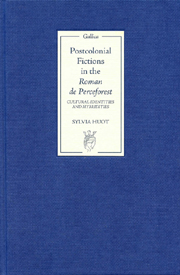Book contents
- Frontmatter
- Contents
- Acknowledgements
- Introduction
- PART I Founding Myths: Nature, Culture, and the Production of a British Kingdom
- PART II Heteronormative Sexuality and the Mission Civilisatrice
- PART III Greeks, Trojans, and the Construction of British History
- Conclusion
- Glossary of Proper Names in Perceforest
- Bibliography
- Index
Introduction
Published online by Cambridge University Press: 05 February 2013
- Frontmatter
- Contents
- Acknowledgements
- Introduction
- PART I Founding Myths: Nature, Culture, and the Production of a British Kingdom
- PART II Heteronormative Sexuality and the Mission Civilisatrice
- PART III Greeks, Trojans, and the Construction of British History
- Conclusion
- Glossary of Proper Names in Perceforest
- Bibliography
- Index
Summary
The vast prose composition known as Perceforest, at this time only partially edited, is the work of an anonymous monastic or clerical author, and was apparently begun under the patronage of William I, Count of Hainaut, Holland, and Zeeland, and father of Queen Philippa, wife of Edward III. The principal modern editor of the work, Gilles Roussineau, has dated its completion, on the basis of internal evidence, to c. 1340–44. The text was reworked in the mid fifteenth century by David Aubert for Philip the Bold, Duke of Burgundy. Perceforest draws on the Old French romance tradition – in particular the prose Tristan, the prose Lancelot-Grail, and the Alexander romances – as well as medieval historiography as developed by Geoffrey of Monmouth, Wace, and others, and travel writing by such authors as Gerald of Wales and Marco Polo. Far from merely reworking the material of its sources, however, it presents an original story line: the ‘chronicle’ of a hitherto unknown period of history when Great Britain was ruled by Greek kings established by Alexander the Great, who was blown off course on his way to Babylon and washed up on English shores. Alexander established two of his followers – characters from the early fourteenth-century Voeux du paon – as kings: Gadifer is king of Scotland, while the new king of England is his brother Betis, soon to be renamed Perceforest. After a difficult start, Perceforest establishes a glittering chivalric society in England, centred on the Franc Palais, a forerunner of the Round Table.
- Type
- Chapter
- Information
- Postcolonial Fictions in the 'Roman de Perceforest'Cultural Identities and Hybridities, pp. 1 - 22Publisher: Boydell & BrewerPrint publication year: 2007



